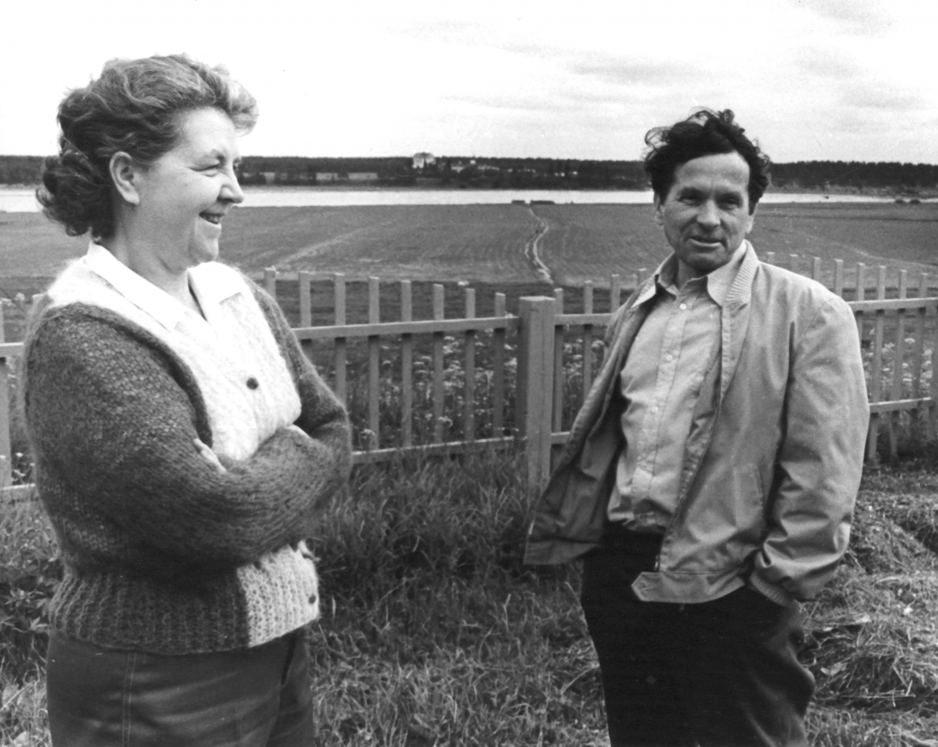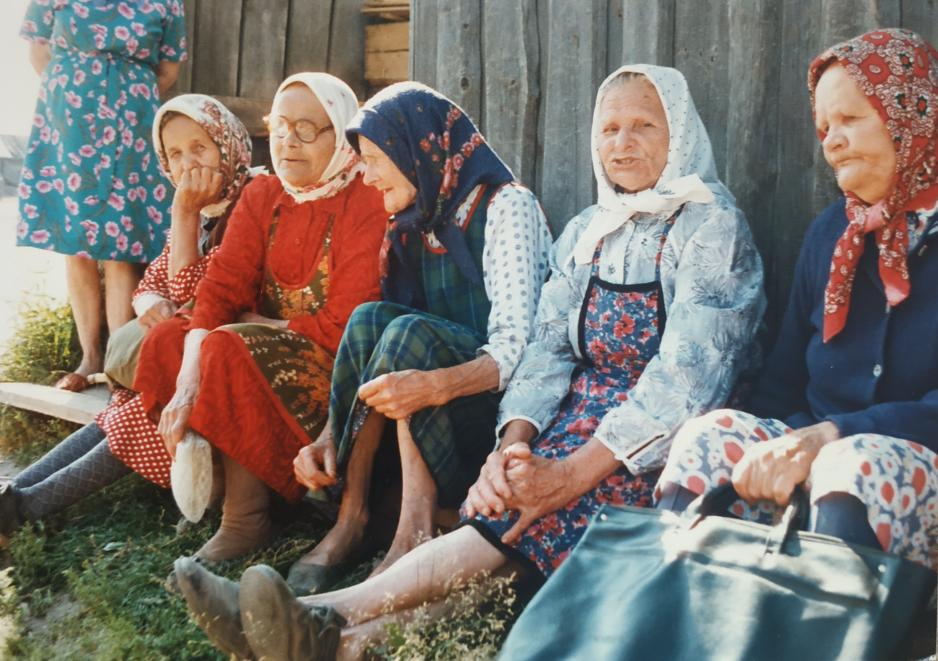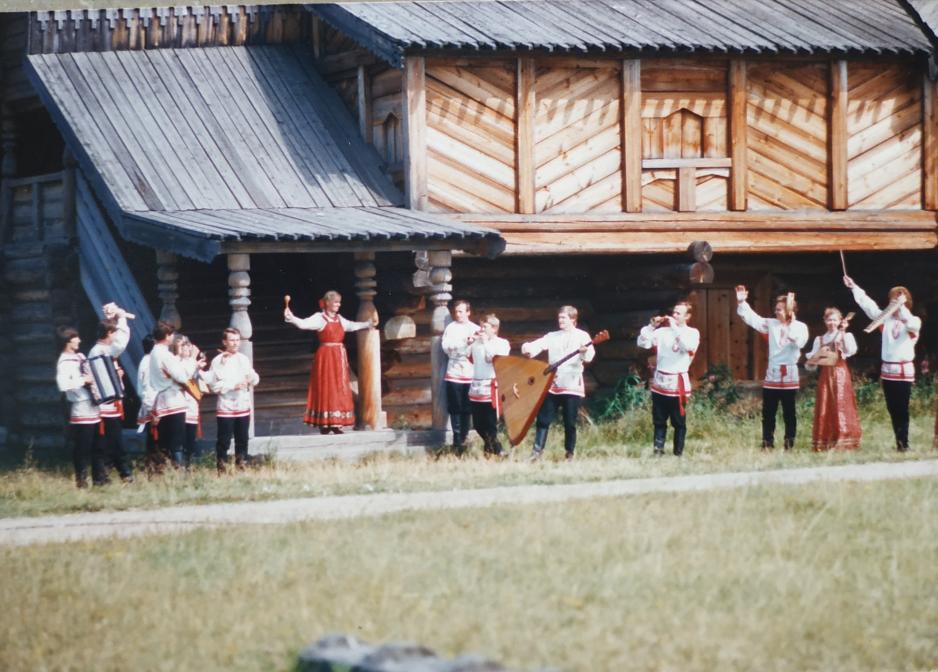Soul of the Russian North Novelist Fyodor Abramov – 100 Years

Fyodor Abramov and his wife Lyudmila Krutikova in Verkola, Arkhangelsk Oblast, 1976. Photographed by Rudolph Kucherov. Photo courtesy of Fyodor Abramov Literary and Memorial Museum.
February 29th marks the 100th birthday of Fyodor Alexandrovich Abramov (1920-1983), the novelist and literary critic whose writings embody the soul of the Russian North.
“We all came out of the village. The village is our origins, our roots.”
Fyodor Abramov is a Russian North cultural icon. Most famous for being one of the main representatives of “village prose,” he wrote novels and stories inspired by his life in the village of Verkola in Arkhangelsk Oblast. Reading Abramov gives us a unique snapshot into the culture and society of the Russian North. His writing helps us understand the history of the Russian North. His literary aim is to truthfully portray life in the northern Russian village. His stories put the current state of development in the Russian North into perspective.

Arkhangelsk Oblast, Russia. Wikimedia Commons.
People of the North
In her recent TEDx talk Prejudices about the Arctic, Alexandra Middleton observes that what is missing from the world’s understanding of social and economic development in the Far North is the human dimension. In the global media, narratives on the Arctic are dominated by climate change, resource extraction and geopolitical tensions. However, understanding the Arctic also requires understanding the challenges, opportunities and lives of people living in and around the polar region.
Middleton says it is odd that far-off governments seek to exert their influence on the Far North region and not include local people as stakeholders. Today, governments need to consider demographic, poverty and education issues alongside national policies to do with the shipping and resources industries.
The geographical characteristics of the northern regions of Russia affect employment and wages. Resultant population decline is a particular problem that has long term consequences.

Grandmothers sitting in Verkola, Arkhangelsk Oblast, August 1986. Courtesy of Dimitri Devyatkin.
Consequently, Abramov’s ideas and writings, that explore the soul of the resilient Russian northerners, are still relevant almost forty years after he passed away.
Going Against the Mainstream
From peasant ancestry, Abramov was studying at Leningrad State University when his studies were interrupted by war and he enlisted as a machine-gunner. He finished his studies in 1951 and taught in Leningrad until 1960.
Soon after Stalin’s death, Abramov published an essay criticizing the idealized portrayal of the Russian countryside in the literature of the forties and fifties. “People in the Kolkhoz Village in Postwar Prose” (1954) criticized the “varnishing of reality” in the works of countryside literature. Abramov called for writing about village life to be guided by literary truth and impartiality. However, his essay was condemned by the Writers’ Union and the Communist Party’s Central Committee.
The writing of the derevenshchiki (writers of village prose) only became possible after the death of Stalin.
“The writing of the derevenshchiki (writers of village prose) only became possible after the death of Stalin,” Professor Vladimir Golstein of Brown University told High North News. “The derevenshchiki produced the only decent prose of the period as they enjoyed literary freedom.”
The villages in Soviet Union were subject to cruel measures, which led to rebellions. We are only now learning the full extent of the Antonov, Tambov and Bashkir rebellions. In the twenties, writers such as Sergei Yesenin to Boris Pilnyak tried to portray them, but writing on the subject declined and gave way to idyllic portrayals of the countryside.

Villagers performing Russian folk music in traditional clothing, Arkhangelsk Oblast, August 1986. Courtesy of Dimitri Devyatkin.
“It was a great joy for everyone when writers like Abramov appeared and began to write about the countryside. Khrushchev, being a peasant deep inside, was rather sympathetic and encouraged publications on this subject.
Stories of the North
Abramov’s awareness of the situation of Russian villagers led him to write several stories and books about the plight of northern Russians. He published his first novel, “Brothers and Sisters” in 1958. The book depicts families working on the
collective farms in the north and the hardships they faced. Addressing the motivation for the book, Abramov said he wished to portray the great feat of women working on the farm, whose labor to support the war effort was as harsh as that of the soldiers on the front.
“Brothers and Sisters” received praise from literary critics. The novel’s reception was perhaps aided by the climate of the Khrushchev Thaw period. The manuscript was rejected by two leading journals before being published in Neva.
In 1963, Abramov published another essay titled, “Around and About,” which was perhaps his firmest criticism of the Soviet collective farm policies. Abramov criticized the Stalin-era law that denied peasants internal passports that effectively constrained the movement of villagers. He also disapproved of the restrictions on agriculture that resulted in an unfavorable allotment of profit shares to the peasantry. Abramov did not explicitly attack collectivization in this essay, but he implied that the collective farm system was imposed on the peasantry. This led to his dismissal from the editorial staff of the literary journal Neva.
They criticized him for speaking the truth. The management didn’t like it, but the readers always supported him.
“They criticized him for speaking the truth,” says Alexandra Abramova, director of the Fyodor Abramov Literary and Memorial Museum. “The management didn’t like it, but the readers always supported him.”
Modern Russian North
Abramov himself “came from the land” and drew sincere attention to everyday struggles in the Russian north. Today, parallels
may be drawn to Russian northerners who criticize Moscow’s policies in the North. In the postwar period, Abramov disapproved of the misbalance of shared profits. Today, there are complaints about the same socioeconomic issue. Northerners say that raw materials are taken from their region and sold abroad but most of the profits end up in Moscow.
Arkhangelsk Oblast, like other regions of the Russian North, suffers from widespread unemployment and a lack of infrastructure and education. Alexandra Abramova told High North News that young people are still leaving the city for work or study and not returning.
The agricultural and forestry enterprises in the North in the seventies, eighties and nineties were destroyed during Perestroika. Nonetheless, there is modernization taking place. “Logging companies have new equipment and are hiring young people. There is a modern wood processing complex being built in the regional center,” says Abramova.
Arkhangelsk has frequently been the venue for the “Arctic: Territory of Dialogue” International Forum for the discussion of Arctic socioeconomic development. Several thousand political, scientific and business leaders from around the world have convened in Arkhangelsk to discuss industry issues such as energy extraction, shipping and tourism. However, there are some socioeconomic issues that local northerners believe are not being properly addressed.
Towards the end of 2019, conservationists and environmental activists protested the construction of a garbage landfill in Arkhangelsk.
Also read
For years, there has been local opposition to the government’s plan to ship more than 2 million tons of garbage a year from Moscow to the Shiyes railway station in Arkhangelsk Oblast. In response to the protests, President Vladimir Putin said it was necessary to take residents’ opinions into account when making decisions. Overall, it is clear that the Russian North has a long history of resident advocates. Like other parts of the world, Russia has a rural-urban divide.
Socialist Realism
The Soviet Union is sometimes portrayed as a place where free and critical expression was officially suppressed and socially off-limits. Despite the official backlash against some of Abramov’s critical writings, Abramov received state awards and was promoted to head the department of Soviet Literature at Leningrad State University in 1956. Later in his life, he became a secretary of the same Writers’ Union which had reprimanded him.
Abramov epitomizes the shifting in boundaries of tolerable narratives regarding the Soviet system. A member of the Communist Party since 1945, Abramov was not anti-Soviet or anti-Russia. He believed that only the truthful portrayal of contemporary farms in fiction would advance socialism. By showing the everyday sorrows and joys of Russian northern peasantry, Abramov was a celebrated figure writing in the literary tradition of “socialist realism.”
Legacy of Abramov
He can be compared to other socially aware writers around the world. American writer John Steinbeck wrote revered novels portraying poverty in the United States during the Great Depression and Dust Bowl. Steinbeck won the Nobel Prize in Literature, yet complained about government harassment. Steinbeck’s eldest son wrote that writers who speak for those without a real voice will naturally become enemies of the political status quo. The international tradition of social critique in literature goes back centuries.
Abramov’s writings drew critical attention to social issues in the Soviet Union right at the beginning of the post-Stalin period. Though he was later ashamed of it, Abramov was involved in the persecution of “cosmopolitan” professors by publishing articles attacking a number of Soviet scholars in 1949.
He was a charismatic individual, beloved by his family and the peasants of a remote village by the northern shore of Russia. Schools and streets in Verkola, Arkhangelsk and Saint Petersburg, and even an asteroid, have been named after him. In May 2019, President Putin named the airport in Arkhangelsk after Abramov. His books are still popular among Russian readers. The governor of Arkhangelsk Oblast declared 2020 the Year of Fyodor Abramov.










